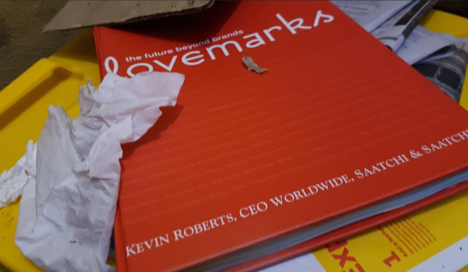Kevin Roberts: the demise of Saatchi & Saatchi’s living Lovemark
The sudden resignation of Saatchi & Saatchi chairman Kevin Roberts over his comments saying the diversity debate “is over” is a stunning outcome for the man who gave the world Lovemarks. Simon Canning looks at how a stellar career came to such an end.
For the better part of 20 years Kevin Roberts strutted the global stage, Saatchi & Saatchi’s living Lovemark, the man who saw the future beyond brands.
The man whose sudden and very public demise on the back of a comment that the diversity debate “is over” sits somewhat ironically against where he began his journey working with and for women in the house of fashion designer Mary Quant.
 Somewhere on this journey, the futurist became a dinosaur.
Somewhere on this journey, the futurist became a dinosaur.
Since 2004, when it was first published, Lovemarks, Roberts’ living business bible that predicted, rightly, that consumers would come to own brands, has become a bible for Saatchi globally. Essential reading for every recruit, it was Roberts’ belief that consumers would come to love the brands that respected them, and that ultimately the future of brands was built on emotional connections that defied the logic of traditional marketing models.


I wanted to like lovemarks but couldn’t shake the feeling it was naff
Was it misguided of Roberts to make the comments? Obviously. Should he have thought more about the likely consequences? Probably. Is shortening his apparently stellar career because of one controversial observation reasonable? Definitely not.
Basically, he has been punished (strongly influenced by an online lynch mob) for sharing what he considered to be an honest observation, based on his career experience. Honesty and openness is not fostered by cutting down those who express beliefs contrary to those we may individually hold.
Simon Canning’s commentary is blatantly ageist. Should he be fired because of this article? Definitely not.
‘like so many of a certain generation, there comes a point where the connection with the world at large is lost.’
Piss off.
‘wedded to a Mad Men’s view of the world’
Mad Men was a fictional TV DRAMA.
The reality is that both sides of this Roberts/Gallop ping-pong are littered with lazy assertions and logical fallacies.
There are serious questions to asked, serious issues to be resolved.
So far, scant amount of the commentary comes anywhere near pointing to a solution.
I just knew it would come to this when his book was called ‘Lovemarks’ and not ‘Lovemarkitas’.
‘Nuff said.
Over 20 years in advertising…how rich is this guy?
Go get a life Kev, there’s so much amazing stuf out there that’s got nothing to do with manipulating emotions to selling crap
All careers come to an end one way or another and it is a pity that Kevin’s career with the Groupe ended this way.
But Simon, it is your article that raises a few interesting questions.
To which age band is your point highlighted by the expression “like so many of a certain generation” targeted?
Is this not an ageist comment, as already noted by Peter M and Eaon?
Is it not as equally discriminatory as Kevin’s remarks relating to women?
Yes it is.
Diversity and inclusiveness must be embraced wholeheartedly by the industry, and that includes (by and of) those of an ‘advanced age’ and the trade press.
Finally, as an aside, I think that in your excitement you forgot a word between ‘visionary’ and ‘dinosaur’…unless you actually meant ‘visionary dinosaur’.
Perhaps you have coined a new term of endearment.